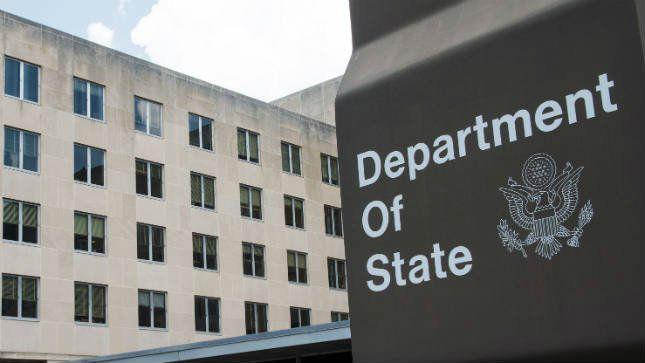US diplomats around the world condemn Donald Trump's 'Muslim ban'
A draft of the memo has been circulating for days

Your support helps us to tell the story
From reproductive rights to climate change to Big Tech, The Independent is on the ground when the story is developing. Whether it's investigating the financials of Elon Musk's pro-Trump PAC or producing our latest documentary, 'The A Word', which shines a light on the American women fighting for reproductive rights, we know how important it is to parse out the facts from the messaging.
At such a critical moment in US history, we need reporters on the ground. Your donation allows us to keep sending journalists to speak to both sides of the story.
The Independent is trusted by Americans across the entire political spectrum. And unlike many other quality news outlets, we choose not to lock Americans out of our reporting and analysis with paywalls. We believe quality journalism should be available to everyone, paid for by those who can afford it.
Your support makes all the difference.Dozens of US diplomats around the world – outraged over Donald Trump’s travel ban – have voiced their opposition to the President in a rare letter of protest.
A draft of the letter, a so-called Dissent Channel Memo, has been circulating among officials. They are concerned that Mr Trump’s executive order banning travel to the US for people from seven Muslim-majority countries, is not only contrary to American values, but will hamper counter-terrorism efforts.
“This ban ... will not achieve its stated aim to protect the American people from terrorist attacks by foreign nationals admitted to the United States,” says the draft, obtained by Lawfareblog.com.
Rather, it said the order will expand anti-American sentiment and “immediately sour relations” with key allies, particularly many of the countries whose citizens are now affected.
The US State Department’s dissent channel is a means for State Department employees to confidentially express policy disagreement. It was created in 1971 as a response to concerns within the department over the government’s handling of the Vietnam War. Earlier this month, four senior officials at the department quit their jobs, rather than serving under Mr Trump.
Mr Trump’s executive order, which also suspended the country’s entire refugee programme for four months, has been marked by widespread protests across the nation, focussing on the airports where dozens of people were detained over the weekend and questioned. The countries affected were Syria, Iraq, Yemen, Somalia, Iran, Libya and Sudan.
The governments of those largely Muslim countries see the White House move as an attack on Islam. By “alienating” such allies, the US government will lose access to valuable intelligence and counter-terrorism resources, the draft said.
It also said that Mr Trump’s “knee-jerk” executive order was based on misguided notions about terrorism in the United States.
“Despite the order’s focus on them, a vanishingly small number of terror attacks on US soil have been committed by foreign nationals who recently entered the US on an immigrant or non-immigrant visa,” it says. “Rather, the overwhelmingly majority of attacks have been committed by native-born or naturalised US citizens – individuals who have been living in the US for decades, if not since birth.”
It adds: “In the isolated incidents of foreign nationals entering the US on a visa to commit acts of terror, the nationals have come from a range of countries, (such as Pakistan or Saudi Arabia), which are not covered by the order.”
On Sunday, as law enforcement agencies were still scrambling to figure out how to implement the executive order and as protests broke out in cities across the country, the White House defended its action, saying the move was necessary “to ensure that the people that we’re letting into our country are coming here with peaceful purposes and not to do us harm”.
“The safety of the American citizens, the safety of our country has got to be paramount,” White House spokesman Sean Spicer told ABC News.
Asked what message the executive order sends to Muslims worldwide, Mr Spicer said: “What it sends is that we’ll protect our country and people.”
The dissent channel is supposed to be a final resort for diplomats to voice their concern. In 1995 then-Secretary of State Warren Christopher warned State Department officials: “Because the dissent channel is not a routine channel and its messages are handled at the highest levels of the department, authors should ensure not only that their views are well grounded and well argued but that other channels are not available to them.”
Last year, more than 50 diplomats filed a dissent memo with the Obama administration, expressing concern over US policy in Syria and calling for military strikes against the Syrian regime.
The Independent has been unable to verify the contents of the draft letter.
Join our commenting forum
Join thought-provoking conversations, follow other Independent readers and see their replies
Comments